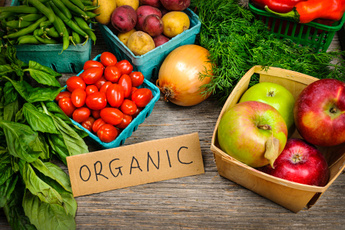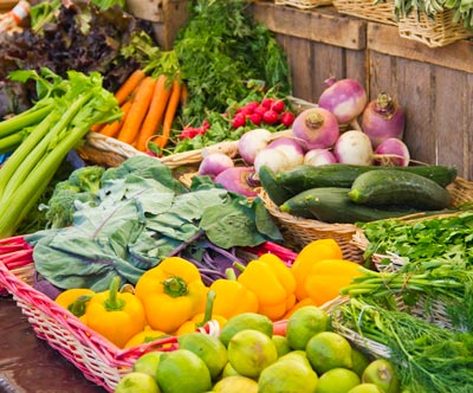Choosing & Preparing Vegetables

Generally, any firm, fresh, raw, pesticide-free vegetable is suitable for fermentation. It is always helpful to culture fresh produce in season and locally grown, whenever possible. Obviously we’re going to do this in the summer and fall as we’re harvesting, but if you’re like me, you’ll get desperate after you run low in February. The temptation to buy the grocery store organic produce in February ends with mixed results. Sometimes, it works out fine, other times, it just doesn’t ferment very well, and yet in other times, it ends in premature spoilage. I have not had a failure yet in a Probiotic Jar with truly fresh organic produce, and have even done very well with grocery store produce when fresh and in season.
Organically grown is ideal. Vegetables sprayed with pesticides and dairy products containing residual antibiotics will have had many of the beneficial LAB killed off, thus contribute anti-microbial compounds to the ferment. It is these LAB which will do the work of fermenting the produce, and when they are compromised, the outcome of the ferment will be uncertain.
Furthermore, any non-organic vegetables may have been irradiated (especially imports), and have insufficient beneficial bacteria remaining to culture the vegetables. Adding a culture such as whey or a specific vegetable culture will not solve the problem. Enzymes that are entirely destroyed by irradiation are intrinsically necessary for fermentation. This is why one cannot lacto-ferment ketchup made from canned tomato paste: because the tomato enzymes have been destroyed.
The best sources of fresh produce are your local farmers markets, in season. Be sure to ask about potential pesticide use on vegetables that are not organically labeled that you have not personally grown.
Start your own backyard or deck garden, where you have complete control over how your vegetables are grown when possible. Purchase The Gardener’s Delight package (here), and preserve the bounty, year after year, from harvest to harvest!
Organically grown is ideal. Vegetables sprayed with pesticides and dairy products containing residual antibiotics will have had many of the beneficial LAB killed off, thus contribute anti-microbial compounds to the ferment. It is these LAB which will do the work of fermenting the produce, and when they are compromised, the outcome of the ferment will be uncertain.
Furthermore, any non-organic vegetables may have been irradiated (especially imports), and have insufficient beneficial bacteria remaining to culture the vegetables. Adding a culture such as whey or a specific vegetable culture will not solve the problem. Enzymes that are entirely destroyed by irradiation are intrinsically necessary for fermentation. This is why one cannot lacto-ferment ketchup made from canned tomato paste: because the tomato enzymes have been destroyed.
The best sources of fresh produce are your local farmers markets, in season. Be sure to ask about potential pesticide use on vegetables that are not organically labeled that you have not personally grown.
Start your own backyard or deck garden, where you have complete control over how your vegetables are grown when possible. Purchase The Gardener’s Delight package (here), and preserve the bounty, year after year, from harvest to harvest!
|
Many grocery stores spray chlorinated water on their organic produce, potentially killing some of the very beneficial species which we hope to culture. If this quality of produce is all that is available, try to find out when deliveries are put out at the store, purchasing them from the box before they are treated with the chlorinated watered, thus increasing your chances for a successful ferment. In spite of the chlorinated water from the store, I have had remarkably consistent success with grocery store produce, when purchasing in season. Beets and carrots, purchased in February, have given mixed results.
Fresh organically-grown herbs are a delightful addition to fermented foods. Dried organic spices can be used, but only whole, not ground, because mold is more prevalent in ground spices, thus increasing the risk of spoilage. Some recipes call for adding ground spices after the primary fermentation stage, and this is safe because the pH of the ferment has already dropped so much that it is an inhospitable environment for any mold in the spice to gain a foothold. |
Wash your fresh organic produce and depending on what your kitchen tap water is like, you might rinse it in a splash of filtered water. (Personally, we don’t have chlorinated, fluoridated water in our kitchen, so I don’t know how much a small amount of these elements affect a ferment, and I would be inclined to avoid the potential problem.)
Prepare your produce, depending upon what your goals are. In the fall, if I want to store a root vegetable such as beets or carrots until next May, I’m going to scrub it, peel it (or not) depending on the condition of the skin, and pack it in the jar whole with the ends trimmed off. This will allow for a much slower ferment, potentially lengthening the amount of time a fermented vegetable will be in really peak condition. While shredded carrots and beets are delicious, the sugars are more accessible to the LAB, thus causing the fermentation process to speed up and will ferment very quickly. They do not last as long ~ even though not technically spoiled, I have noticed that sometimes my beets taste “old” after about four months. When I compare any other method of storing these vegetables into the winter, raw, with enzymes and vitamins enhanced, I simply can’t feel badly about “just four months” compared to about 10 days or so in the fridge, or the blanched enzyme-killed freezer method.
Prepare your produce, depending upon what your goals are. In the fall, if I want to store a root vegetable such as beets or carrots until next May, I’m going to scrub it, peel it (or not) depending on the condition of the skin, and pack it in the jar whole with the ends trimmed off. This will allow for a much slower ferment, potentially lengthening the amount of time a fermented vegetable will be in really peak condition. While shredded carrots and beets are delicious, the sugars are more accessible to the LAB, thus causing the fermentation process to speed up and will ferment very quickly. They do not last as long ~ even though not technically spoiled, I have noticed that sometimes my beets taste “old” after about four months. When I compare any other method of storing these vegetables into the winter, raw, with enzymes and vitamins enhanced, I simply can’t feel badly about “just four months” compared to about 10 days or so in the fridge, or the blanched enzyme-killed freezer method.

